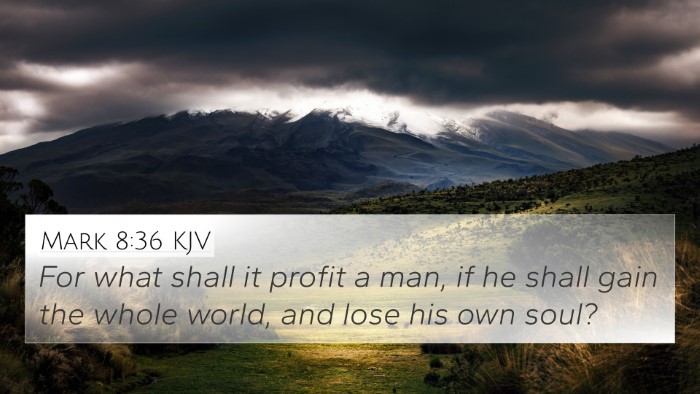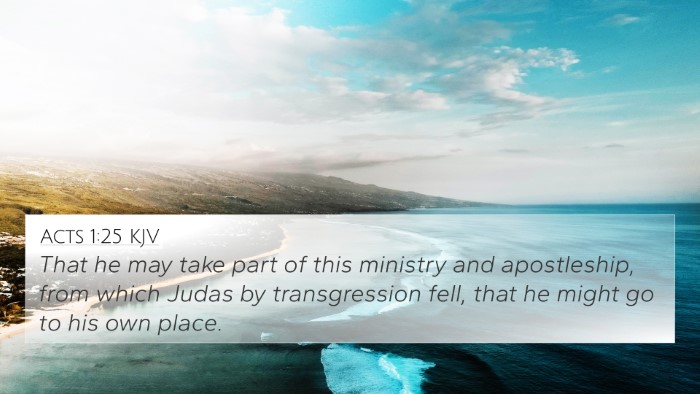Understanding Luke 9:25
Luke 9:25 states, "For what is a man advantaged, if he gain the whole world, and lose himself, or be cast away?" This verse encapsulates profound biblical truths regarding the nature of human value, priorities, and salvation. The insights derived from esteemed public domain commentaries shed light on the implications and applications of this verse.
Verse Meaning
According to Matthew Henry, this passage underscores the vanity of earthly gains when faced with the eternal consequences of one's soul. The verse serves as a stark reminder that material success is fleeting and of little significance compared to one's spiritual state.
Albert Barnes elaborates that Jesus challenges His followers to consider what true profit there is in gaining worldly possessions if it leads to spiritual loss. The verse serves as a warning against misplacing priorities, emphasizing that the soul’s eternal value outweighs temporal achievements.
Adam Clarke further highlights that the wording indicates not just a loss of the soul, but the severe implications of being 'cast away.' This suggests a loss of both purpose and belonging, which can occur when one prioritizes the material over the spiritual. Clarke also notes the rhetorical nature of the question, encouraging reflection on life choices.
Thematic Connections to Other Bible Verses
Understanding the depth of Luke 9:25 requires examining its connections to other Scripture passages. Here are some notable cross-references that enrich the meaning of this verse:
- Mark 8:36-37: "For what does it profit a man to gain the whole world, and forfeit his soul?" This parallel echoes the teaching of Luke 9:25, reinforcing the theme of spiritual over material wealth.
- Matthew 16:26: Similar to Mark, this verse highlights the futility of worldly gain in light of eternal realities.
- James 4:14: “You do not know what tomorrow will bring. What is your life? For you are a mist that appears for a little time and then vanishes.” This verse emphasizes the transitory nature of life and by extension, material pursuits.
- Matthew 6:19-21: "Do not lay up for yourselves treasures on earth, where moth and rust destroy…" This passage presents a clear teaching about prioritizing heavenly treasures over earthly ones.
- 1 Timothy 6:7: "For we brought nothing into the world, and we cannot take anything out of the world." This underscores the ephemeral quality of earthly possessions.
- Romans 12:2: "Do not be conformed to this world, but be transformed by the renewal of your mind…" Encourages believers to transcend worldly values in favor of God’s will.
- Philippians 3:19: “Their end is destruction, their god is their belly, and they glory in their shame, with minds set on earthly things.” This highlights the dangers of prioritizing earthly desires.
Applications and Reflections
Luke 9:25 invites profound personal reflection on one's aspirations and the true cost of pursuing worldly success. The commentators encourage a re-evaluation of priorities, urging readers to contemplate the eternal ramifications of their daily choices. It challenges believers to weigh their ambitions against the call to follow Christ faithfully, emphasizing that following Him may involve sacrifices that appear contrary to worldly wisdom.
Considerations for Cross-Referencing Bible Texts
For those exploring biblical themes or preparing for sermon delivery, utilizing a comprehensive Bible cross-reference guide can deepen understanding. Consider these tools:
- Bible Concordance: A valuable resource for locating related verses and themes.
- Cross-Reference Bible Study Methods: Approaching scriptures methodically to uncover thematic connections.
- Bible Reference Resources: Materials that highlight relationships between differing texts to illuminate meaning.
Conclusion
Luke 9:25 serves as a vital reminder of the eternal value of the soul over transient earthly gains. The connections between Bible verses enhance the understanding that the pursuit of worldly success, when it comes at the cost of one's spiritual health, bears no true profit. As believers navigate their faith journey, they are implored to seek first the Kingdom of God, ensuring that their choices align with God’s eternal purpose.
















